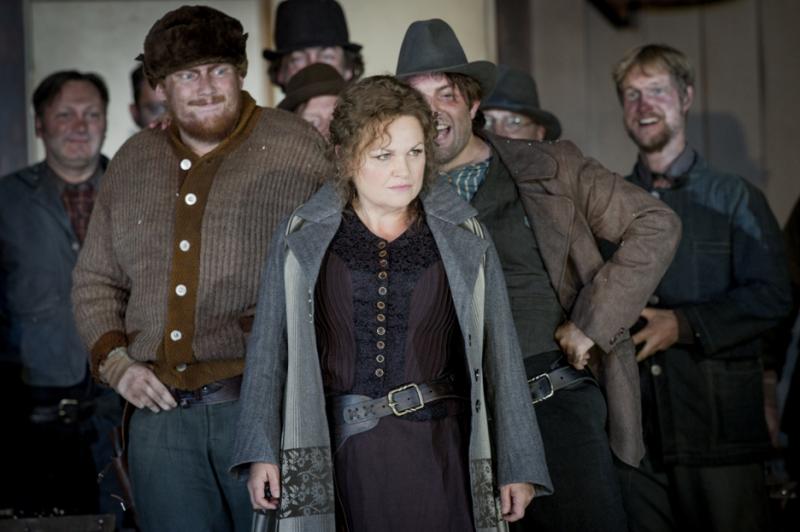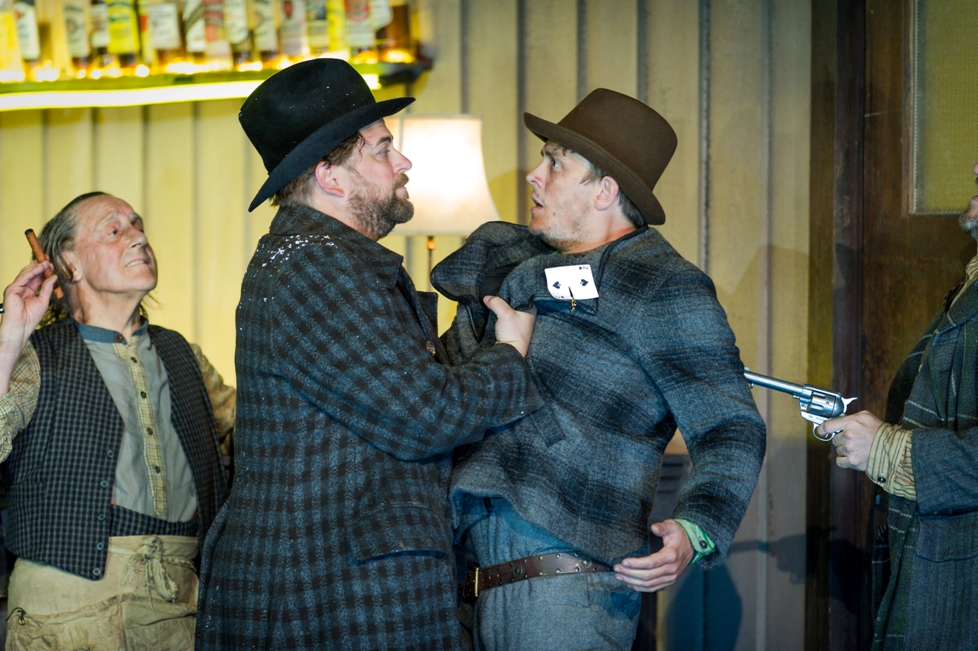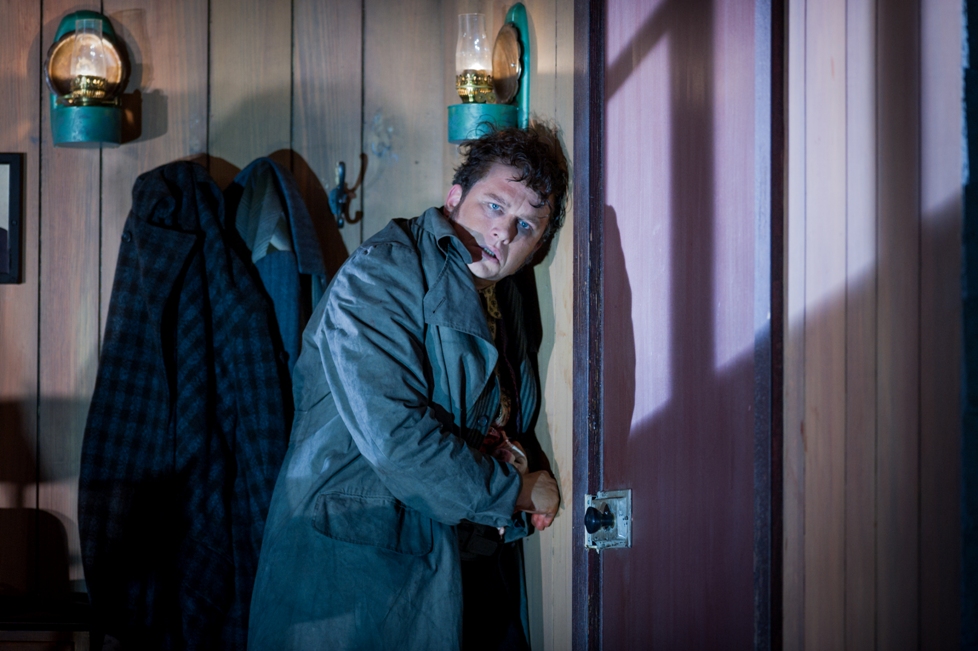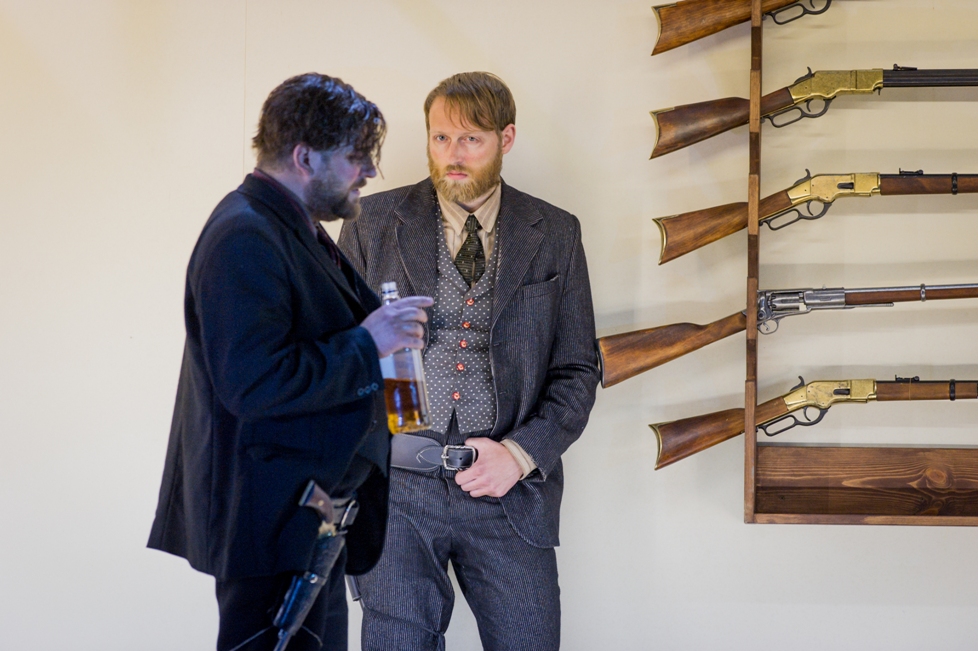The Girl of the Golden West, English National Opera | reviews, news & interviews
The Girl of the Golden West, English National Opera
The Girl of the Golden West, English National Opera
Susan Bullock's Minnie gets her gun, and her man, in Puccini's wackiest melodrama

So now it’s Minnie Get Your Gun from the director who brought us the gobsmackingly inventive Young Vic Annie (as in sharpshooter Oakley, not Little Orphan).
Jones knows better in his maturity than to throw out much of Puccini’s meticulous realistic background to a romantic, even idealistic melodrama; unlike his Annie, but very like his Welsh National Opera Mastersingers, coming to ENO in the spring, there's more than usual fidelity to time and place. For all the usual pared-down focus of regular Jones collaborator Miriam Buether’s trademark sets and consummate, if this time unobtrusive lighting by Mimi Jordan Sherin, the locale is most helped by Kelly Rourke’s free translation of a rather good libretto by one Zangarini, itself a fairly faithful rendering of David Belasco’s Wild West play. That means accents to match, excellent from our heroine, needing some toning-down from some of the comprimario roles (Leigh Melrose's Sonora, for one, though he sings as well as ever).
 It’s mostly a man’s world, the Californian mountain misery of homesick miners, with pre-echoes of Janáček’s From the House of the Dead and even Britten’s Billy Budd. But two women hold the trump cards: on stage, the Minnie of Susan Bullock, our most successful Wagnerian soprano export as an in-demand Brünnhilde around the world, playing no-nonsense, golden-hearted Minnie of the Polka Saloon, and in the pit Canadian conductor Keri-Lynn Wilson, who hurls us into Puccini’s whole-tone vortex and takes us by surprise as the lights rapidly dim. Her approach mixes full-bloodedness with pointillist-flecked lyricism very well; only in the second-act crux could I have done with a bit more spring-heeled pace.
It’s mostly a man’s world, the Californian mountain misery of homesick miners, with pre-echoes of Janáček’s From the House of the Dead and even Britten’s Billy Budd. But two women hold the trump cards: on stage, the Minnie of Susan Bullock, our most successful Wagnerian soprano export as an in-demand Brünnhilde around the world, playing no-nonsense, golden-hearted Minnie of the Polka Saloon, and in the pit Canadian conductor Keri-Lynn Wilson, who hurls us into Puccini’s whole-tone vortex and takes us by surprise as the lights rapidly dim. Her approach mixes full-bloodedness with pointillist-flecked lyricism very well; only in the second-act crux could I have done with a bit more spring-heeled pace.
This is perhaps the composer’s most elaborately orchestrated and most symphonic score, Debussyan subtlety and Wagnerian oceanic force rolled into one; it relies less on one sweeping melody after another – though several do carry us along - than on the mining of short, malleable motifs. But what Wilson, Jones and the men of the ENO Chorus along with the whole host of smaller parts – ranging from the clarion veteran Graham Clark as bartender Nick (pictured above on the left with Craig Colclough's Rance and Jonathan McGovern's Sid) to young lyric tenor Sam Furness’s voice gleaming occasionally through the textures - make us most aware of within minutes is the dramatic fluctuation between masculine violence and feminine yearning. Perhaps the fact that this is Puccini’s own essential make-up is what grips us so much when nothing is happening other than elaborate set-up.
 The boys miss their mamas and their pets back home to a wonderful American folksong which Puccini, yielding his usual compositional autonomy, leans on throughout (now, thanks to the supertitles, I’m no longer wondering what "The Old Dog Tray", the title of the song, might mean – our minstrel, George Humphries as a blind, omnipresent Jake Wallace, is singing about the old dog, Tray). But then they’re just as ready to lynch one of their crew for cheating at cards, a situation which will come back to haunt our upright heroine when she dares all for love.
The boys miss their mamas and their pets back home to a wonderful American folksong which Puccini, yielding his usual compositional autonomy, leans on throughout (now, thanks to the supertitles, I’m no longer wondering what "The Old Dog Tray", the title of the song, might mean – our minstrel, George Humphries as a blind, omnipresent Jake Wallace, is singing about the old dog, Tray). But then they’re just as ready to lynch one of their crew for cheating at cards, a situation which will come back to haunt our upright heroine when she dares all for love.
Jones is more subtly stylized than usual in switching the stage mood from still sadness to violent flare-ups. Sure, these guys are sentimental, and so is their beloved Minnie in preaching love and redemption. But she has a convincing reason in one of those many not-quite arias which give us backstory – in this case an always-in-love ma and pa to make her yearn for something good. Sheriff Jack Rance won’t provide it, since he listens only to money; the fugitive bandit passing himself off as newcomer Dick Johnson of Sacramento (Peter Auty, pictured above in Act Two) clearly will, for all his dissembling. Jones beautifully underlines what draws these two together; Bullock and Peter Auty are deeply impressive in their quiet, hopeful moments.
The melodrama piles on potential hokum in a second act which takes its blueprint from the Tosca-Cavaradossi-Scarpia triangle (though it starts piquantly with an understated colloquy between Clare Presland and Jimmy Holiday as the two Native Americans in the opera). Craig Colclough is no overpowering Verdi/Puccini baritone, rather a bass-baritone paradoxically most impressive in his upper register, but that helps keep his Sheriff human. The poker game he plays with Minnie for Ramerrez’s life, divided double-basses thrumming with almost unbearable tension, ends in what’s presented here as a deliberate anti-climax; Minnie cheats and wins, it’s all over in a second.
 Rance’s drunken alienation in Act Three is convincing, too (Colclough pictured right with Nicholas Masters' Ashby), and the lynch-mob chorus, taking place not in the expected big country but all in lines outside the sheriff’s office, duly terrifies, with Lucy Burge's choreography having the men break out into a scary stomp. Auty rises to impressive heroic heights and pulls off the opera’s one hit aria, Bullock hits all the top Cs she needs to even if it’s not always a beautiful sound; neither voice is exactly Italianate or lush, but like Colclough, these lovers ultimately tell the truth and we believe in their right to happiness.
Rance’s drunken alienation in Act Three is convincing, too (Colclough pictured right with Nicholas Masters' Ashby), and the lynch-mob chorus, taking place not in the expected big country but all in lines outside the sheriff’s office, duly terrifies, with Lucy Burge's choreography having the men break out into a scary stomp. Auty rises to impressive heroic heights and pulls off the opera’s one hit aria, Bullock hits all the top Cs she needs to even if it’s not always a beautiful sound; neither voice is exactly Italianate or lush, but like Colclough, these lovers ultimately tell the truth and we believe in their right to happiness.
Jones’s coup, a simpler parallel to the separating of the mafia family rooms in his recent Rodelinda, comes at the end; it’s not exactly a ride off into the sunset, nor any drastic alternative, but a stage picture that reflects in its own special way the glowing twilight embers, sadness even, of the epilogue. Quietly impressive, grounded in real human emotions despite a plot that’s often preposterous, this production is as nuanced as Jones’s more outlandish creations, and if in the end we love and respect Puccini the more, that’s a job well done by all concerned.
rating
Explore topics
Share this article
more Opera
 Simon Boccanegra, Hallé, Elder, Bridgewater Hall, Manchester review - thrilling, magnificent exploration
Verdi’s original version of the opera brought to exciting life
Simon Boccanegra, Hallé, Elder, Bridgewater Hall, Manchester review - thrilling, magnificent exploration
Verdi’s original version of the opera brought to exciting life
 Aci by the River, London Handel Festival, Trinity Buoy Wharf Lighthouse review - myths for the #MeToo age
Star singers shine in a Handel rarity
Aci by the River, London Handel Festival, Trinity Buoy Wharf Lighthouse review - myths for the #MeToo age
Star singers shine in a Handel rarity
 Carmen, Royal Opera review - strong women, no sexual chemistry and little stage focus
Damiano Michieletto's new production of Bizet’s masterpiece is surprisingly invertebrate
Carmen, Royal Opera review - strong women, no sexual chemistry and little stage focus
Damiano Michieletto's new production of Bizet’s masterpiece is surprisingly invertebrate
 La scala di seta, RNCM review - going heavy on the absinthe?
Rossini’s one-acter helps young performers find their talents to amuse
La scala di seta, RNCM review - going heavy on the absinthe?
Rossini’s one-acter helps young performers find their talents to amuse
 Death In Venice, Welsh National Opera review - breathtaking Britten
Sublime Olivia Fuchs production of a great operatic swansong
Death In Venice, Welsh National Opera review - breathtaking Britten
Sublime Olivia Fuchs production of a great operatic swansong
 Salome, Irish National Opera review - imaginatively charted journey to the abyss
Sinéad Campbell Wallace's corrupted princess stuns in Bruno Ravella's production
Salome, Irish National Opera review - imaginatively charted journey to the abyss
Sinéad Campbell Wallace's corrupted princess stuns in Bruno Ravella's production
 Jenůfa, English National Opera review - searing new cast in precise revival
Jennifer Davis and Susan Bullock pull out all the stops in Janáček's moving masterpiece
Jenůfa, English National Opera review - searing new cast in precise revival
Jennifer Davis and Susan Bullock pull out all the stops in Janáček's moving masterpiece
 theartsdesk in Strasbourg: crossing the frontiers
'Lohengrin' marks a remarkable singer's arrival on Planet Wagner
theartsdesk in Strasbourg: crossing the frontiers
'Lohengrin' marks a remarkable singer's arrival on Planet Wagner
 Giant, Linbury Theatre review - a vision fully realised
Sarah Angliss serves a haunting meditation on the strange meeting of giant and surgeon
Giant, Linbury Theatre review - a vision fully realised
Sarah Angliss serves a haunting meditation on the strange meeting of giant and surgeon
 Der fliegende Holländer, Royal Opera review - compellingly lucid with an austere visual beauty
Bryn Terfel's Dutchman is a subtly vampiric figure in this otherworldly interpretation
Der fliegende Holländer, Royal Opera review - compellingly lucid with an austere visual beauty
Bryn Terfel's Dutchman is a subtly vampiric figure in this otherworldly interpretation
 The Magic Flute, English National Opera review - return of an enchanted evening
Simon McBurney's dark pantomime casts its spell again
The Magic Flute, English National Opera review - return of an enchanted evening
Simon McBurney's dark pantomime casts its spell again
 Così fan tutte, Welsh National Opera review - relevance reduced to irrelevance
School for lovers not much help to the singers
Così fan tutte, Welsh National Opera review - relevance reduced to irrelevance
School for lovers not much help to the singers

Add comment